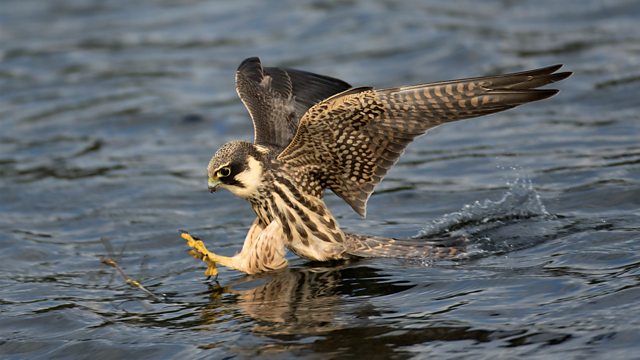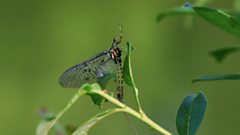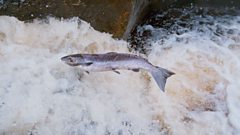Freshwater
David Attenborough takes us on a journey from source to sea, following the course of our fresh water to reveal a host of astonishing wildlife.
From highland burns in the Scottish Cairngorms to vast mudflats in Norfolk, David Attenborough takes us on a journey from source to sea, following the course of our fresh water as it journeys through our landscapes. Along the way we meet a host of wildlife that lives in, on and around our rivers, lakes, and lochs.
Determined Atlantic salmon battle their way upstream in one of the greatest migrations on the planet - fighting against the flow and the odds to get back to their breeding grounds in the uplands. Beavers slow the flow down with their dam building, in the process creating habitat for creatures such as raft spiders that thrive in these slow-moving watercourses.
Our chalk streams are some of the rarest and most precious types of freshwater system in the world, and above them millions of mayflies hatch, dance and mate for just a few days each summer. On the riverbank, a secretive small mammal, the water shrew, lives life in the fast lane. Its high metabolism drives a constant, frenetic search for food, both above and below the surface
At night our rivers come alive too, providing hunting territories for Daubentonβs bats that skim their prey from on and above the surface. Itβs easy to see how they have earned their common name of βwater batsβ. Darkness is also when our toads migrate, moving en masse to their traditional breeding grounds every spring. A few months later, the resulting toadlets must make their way out of the ponds and back to their woodland home - the most dangerous journey of their young lives.
As our rivers slow, they spread out, and huge areas of reedbed form. Hobbies, small agile birds of prey, swoop low and fast to catch dragonflies acrobatically in the summer sun, and in early spring great crested grebes pair up in one of the most complex and beautiful courtship ceremonies in the natural world.
Where our freshwater reaches the sea, vast mudflats can form, full of rich earth carried down by the river. These habitats are a magnet to hundreds of thousands of overwintering wading birds, migrants that come to fuel up on the hidden food below the mud. But they attract their own predators too. Peregrine falcons visit our coasts every year, and these migrants are on their menu.
Last on
Clips
-
![]()
Mayflies
Duration: 01:25
-
![]()
Atlantic salmon
Duration: 01:42
Credits
| Role | Contributor |
|---|---|
| Presenter | David Attenborough |
| Director | Chris Howard |
| Editor | Martin Elsbury |
| Series Producer | Hilary Jeffkins |
| Series Producer | Alastair Fothergill |
| Production Company | Silverback Films Ltd |
Broadcasts
- Sun 2 Apr 2023 19:00
- Sun 9 Apr 2023 16:35ΒιΆΉΤΌΕΔ One except Scotland, Scotland HD, Wales & Wales HD
- Mon 24 Apr 2023 03:05
- Sun 29 Sep 2024 15:50ΒιΆΉΤΌΕΔ One except HD, Wales, Wales HD & Nightlight
Explore our wild isles with The Open Universityβs interactive map
Go on a journey through the wildlife and habitats of Britain and Ireland.



